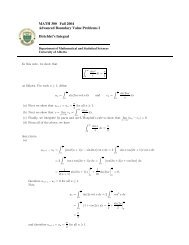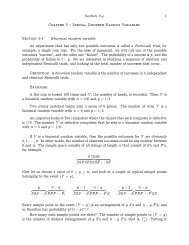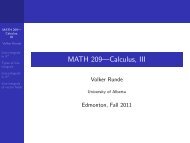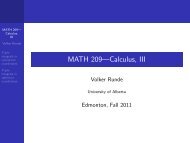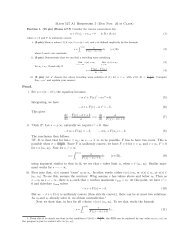Math 411: Honours Complex Variables - University of Alberta
Math 411: Honours Complex Variables - University of Alberta
Math 411: Honours Complex Variables - University of Alberta
Create successful ePaper yourself
Turn your PDF publications into a flip-book with our unique Google optimized e-Paper software.
Pro<strong>of</strong>. Let ζ ∈ ∂Br(z0), and note that<br />
1<br />
ζ −z =<br />
1<br />
(ζ −z0)−(z −z0)<br />
= 1<br />
ζ −z0<br />
1<br />
1− z−z0<br />
ζ−z0<br />
�<br />
�<br />
Since |z −z0|< r and |ζ −z0|= r, we have � z−z0<br />
�<br />
�<br />
� < 1, so that<br />
ζ−z0<br />
1<br />
ζ −z =<br />
∞�<br />
� �n 1 z −z0<br />
=<br />
(ζ −z0) ζ −z0 n=0<br />
�<br />
� (z−z0) n<br />
Since � (ζ−z0) n+1<br />
�<br />
�<br />
� =<br />
lute and uniform convergence on ∂Br(z0).<br />
∞�<br />
n=0<br />
1<br />
(ζ −z0) n+1(z −z0) n .<br />
|z−z0| n<br />
rn+1 and �∞ |z−z0|<br />
n=0<br />
n<br />
rn+1 < ∞, the Weierstraß M-test yields abso-<br />
Theorem 6.3 (Power Series for Holomorphic Functions). Let D ⊂ C be open. Then<br />
the following are equivalent for f: D → C:<br />
(i) f is holomorphic;<br />
(ii) for each z0 ∈ D, there exists r > 0 with Br(z0) ⊂ D and a0,a1,a2,... ∈ C such<br />
that f(z) = � ∞<br />
n=0 an(z −z0) n for all z ∈ Br(z0);<br />
(iii) for each z0 ∈ D and r > 0 with Br(z0) ⊂ D, we have<br />
for all z ∈ Br(z0).<br />
f(z) =<br />
∞�<br />
n=0<br />
f (n) (z0)<br />
(z −z0)<br />
n!<br />
n<br />
Pro<strong>of</strong>. (iii) =⇒ (ii) is trivial; (ii) =⇒ (i) follows from Theorem 3.2.<br />
(i) =⇒ (iii): Let z0 ∈ D, and let r > 0 be such that Br(z0) ⊂ D. Let z ∈ Br(z0)<br />
and choose ρ ∈ (0,r) such that z ∈ Bρ(z0). Then we have:<br />
f(z) = 1<br />
�<br />
f(ζ)<br />
2πi ∂Bρ(z0) ζ −z dζ<br />
= 1<br />
� ∞� f(ζ)<br />
2πi ∂Bρ(z0) (ζ −z0)<br />
n=0<br />
n+1(z −z0) n dζ, by Lemma 6.3,<br />
∞�<br />
� � �<br />
1 f(ζ)<br />
=<br />
dζ (z −z0)<br />
2πi<br />
n=0 ∂Bρ(z0) (ζ −z0) n+1 n , by Lemma 6.1,<br />
∞� f<br />
=<br />
(n) (z0)<br />
(z −z0)<br />
n!<br />
n .<br />
n=0<br />
.<br />
45



